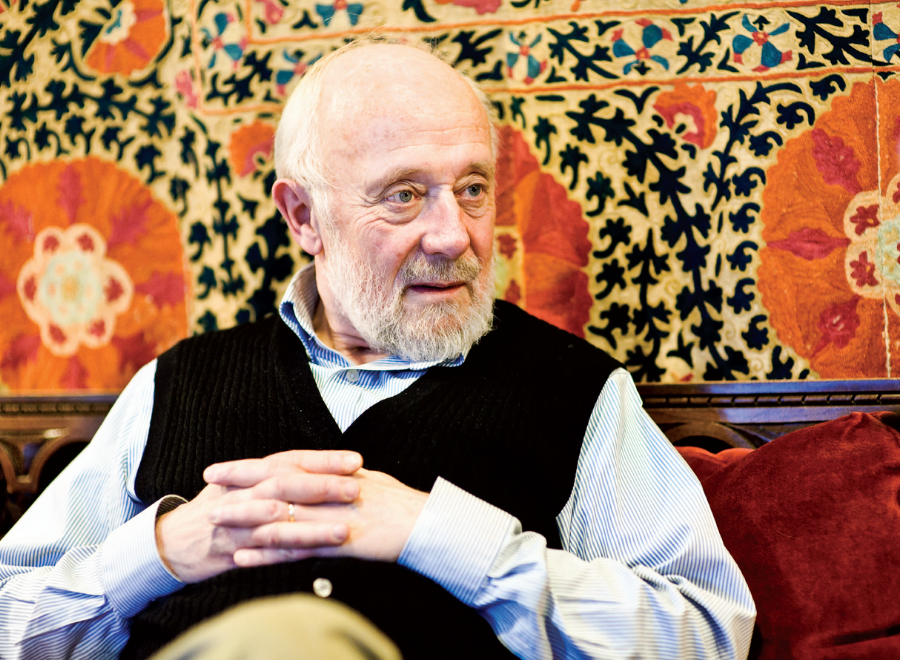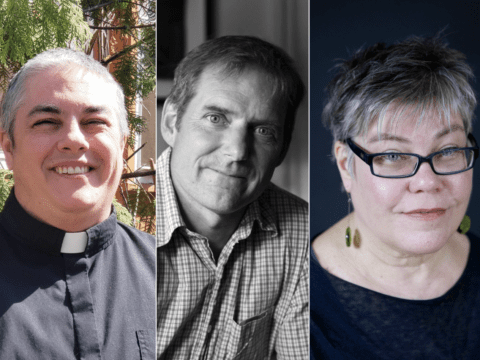Marcus Borg’s scholarship has radically reshaped modern understandings of Scripture. He met with Therese DesCamp in Berkeley, Calif., to talk about his most recent books — Putting Away Childish Things and Speaking Christian — and the importance of story and language.
THERESE DESCAMP: After years of popular theology, you recently wrote the novel Putting Away Childish Things. Can you tell me why you decided to write a work of fiction?
You may unsubscribe from any of our newsletters at any time.
MARCUS BORG: For as long as I remember, I’ve wanted to write a novel. I had the idea that writing fiction was more of an artistic endeavour than non-fiction. I know that’s not necessarily true, but I had that idea. Plus, I was genuinely curious whether I could tell a good story at considerable length, and what it would be like to create characters. I also thought that some people who might never read a book of theology might read a novel that had lots of good theology and religious scholarship in it.
TD: And how was the experience of writing fiction for you?
MB: The experience of writing the novel was a struggle for a long time because I thought I needed to know what the plot was. I wrote the first few pages 10 years ago, but I could never get beyond them. But two years ago, I spent a week in Amsterdam alone and had a creative breakthrough. I decided that I would start by focusing on the characters. I wrote out a page for each one: who they are, what they do, where they are. Then I put them in a setting and saw what happened. It was the breaking of an ice jam, and I finished the book in eight months.
When you’re writing non-fiction, you know what’s going to be in a chapter before you start writing it. You’ve decided what topics you’re going to cover, the sequence of the subject matter. Then the rest of the writing is like carpentry work, making things fit into their appropriate places.
Writing a novel was completely different. I might have a broad idea about what was going to happen in a chapter — say, Kate and Martin are going out to dinner — but I wouldn’t know what a given character would do. I wouldn’t know until I sat down and said, “Okay, Martin said this; I wonder what Kate will say to that?” Then I’d find that sometimes the character would have a witty response; sometimes it would be a serious, even revealing response.
Once I had the first 30 or 40 pages done, I knew what was in character or out of character for each person. I might not catch it until the next day when I reread what I’d written, but then I’d think, no, I don’t think she would have said that.
I’m working on a sequel now because the book’s been received very positively. People tell me I must write another book because they want to know what happens to these people.
TD: Is there something about the open-endedness of fiction that the church needs to pay attention to?
MB: Well, I think some of the parables of Jesus are very open-ended. Let me give you an illustration: the parable of the workers in the vineyard, Matthew 20. Interpreters over the centuries have given it a certain meaning: the vineyard owner who pays all the workers the same amount at the end of the day, whether they worked one hour or 11 hours, is God. So this is a parable of radical grace. We all get the same reward as long as we work at least a little bit.
I don’t think that’s what the parable is about. Remember, Jesus is speaking to the peasant class, and for them, the wealthy landowner was seldom the hero. We have to think, how would peasants hear this story? Would they see the vineyard owner as generous? Or would they see him as a son of a gun because he was trying to get by with as few workers as he could? Remember, the landowner doesn’t hire enough help in the morning and has to go back several times; on one of those occasions, he says to this guy who wasn’t hired, who’d been looking for work all day, “Why do you stand here idle?” He calls him lazy!
So a peasant might say,“Wow, this stinker who’s accumulated all this land, basically off our backs, who’s trying to get by with as small a labour force as possible, who, when he needs more of us, calls us lazy — at the end of the day, he expects us to see him as generous?” I think this is a very open-ended parable whose purpose is to get the hearers into conversation about the way things work in this world and how ungenerous the rich are.
So yes, open-ended storytelling is important. But here’s a critical comment, specifically about “story preaching.” When a story is used to illustrate, that’s fine; but when narrative becomes a substitute for exegetical [Scripture-based] preaching, I don’t like it. There’s such unawareness of the Bible in our culture, including among people who go to church, that non-biblical story preaching just deepens that ignorance. I think there is a way of doing biblical narrative preaching that can be open-ended. It doesn’t have to be, “Here are three lessons.”
TD: What do you think it would be like if we seriously believed that the parables are open-ended, than the Christian story is not finished?
MB: Let me give an analogy. When I thought I had to know the plot of the novel ahead of time, I couldn’t write it. If I need to know how my life works out before I can live it, I can’t really live it. I think the parables make it clear that we don’t know the whole plot. This under- standing can be very helpful, not just for our own lives but for the church and the world more broadly.
TD: You mentioned “non-biblical” preaching. How do you feel about post-theistic arguments that Christian stories are language are so misunderstood that we have to find a different language and different stories?
MB: I think post-theists have some confusion about whether the word “God” refers to a supernatural authority figure out there who intervenes in the world, or to the Mystery within. My central claim is that the church needs to reclaim, not reject, Christian language. Actually, this is the premise for my newest book, Speaking Christian. In it, I identify that there are three problems afflicting Christian language. The first I’ve mentioned: Christian language is increasingly unfamiliar. The second obstacle is the literalization of Christian language. But the third issue, and the focus of the book, is the framework in which we hear these words. I call that framework “heaven and hell Christianity”; it’s the common Christianity of the recent past.
An example: in this framework, we understand “the Saviour” as the one who saves us from our sins. But in the Bible, “saving” is never about sin. A saviour heals; a saviour brings one back from exile and captivity.
Religions are like languages: to be Christian is to speak Christian. Not that we have to speak the ancient languages, but that we have to employ the basic vocabulary, the central stories and the words embedded in the rituals of Christianity. If that language becomes seriously misunderstood, then Christianity ceases to exist. If Christianity is to survive, we need to reclaim our big words by articulating their rich biblical meanings, not abandoning them.
***
This story first appeared in The United Church Observer’s September 2011 issue with the title “‘To be Christian is to speak Christian.’”













